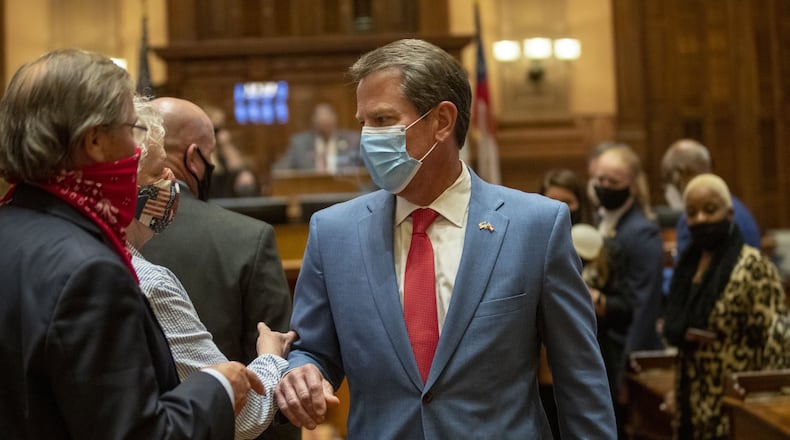Three months ago state officials were concerned all the work done to build up the government’s financial reserve since the Great Recession would be quickly wiped out by the COVID-19 downturn.
But that hasn’t happened.
Tax collections — which were expected to plummet by $1 billion or more in only a few months — came in stronger than expected. And most of the $2.8 billion in savings the state had built up by the beginning of 2020 remains in reserve.
That’s good news for Gov. Brian Kemp and a General Assembly that, only two months ago, cut $2.2 billion in spending — including $950 million from k-12 schools. They may need the banked money in the next few years to avoid further budget cuts.
“We weathered the end of the fiscal year and the beginning of the pandemic well,” said state Rep. Brett Harrell, R-Snellville, chairman of the Georgia House tax committee. “This is exactly the reason why we need reserves. This pandemic proves why adequate reserves are good and prudent.”
But state Rep. Scott Holcomb, D-Atlanta, a member of the House budget committee, said there are “a lot of unknowns” about what lies ahead for the economy and the programs the state supports.
“I think we are in a period of prolonged uncertainty,” Holcomb said, until a coronavirus vaccine is created. “It is very difficult to make any solid policy judgments or decisions in this atmosphere.”
States across the country went into the COVID-19 recession in much better financial shape than during the last downturn. They had put away about $75 billion in reserves to pay for everything from teacher salaries to prisons, roads to universities, public health programs to food safety inspectors.
But economists have predicted this downturn would hit states much harder, and faster, than the Great Recession more than a decade ago, quickly wiping out savings accounts and forcing massive spending cuts, layoffs and furloughs.
Nationally, about 1.5 million college, school and other government workers were laid off or furloughed during the early months of the COVID-19 recession, eclipsing the declines during the Great Recession, according to U.S. Department of Labor figures.
In Georgia, officials and analysts feared a drop in revenue collections of $1 billion or more during the April-June quarter, the final three months of the fiscal year.
The pandemic shutdown in March and April caused millions of people to lose their jobs and businesses to shut down. Some of the jobs, and some of the businesses, have come back, some haven’t.
The shutdown, and the continuing recession that followed, was expected to mean big drops in state income and sales tax collections — the state’s two major sources of revenue.
But instead of a decline of $1 billion to $1.5 billion in those three months, officials said the gap between what the state budgeted and what it took in is closer to $260 million.
And the gap could be further closed when budget officials receive all the funds from state agencies that were appropriated but never spent, a figure that is not yet known.
In the end, the state will still have most of the about $2.8 billion it had in reserve when the year started.
That’s important because the state uses the reserve to help pay its bills in a downturn.
Through Georgia’s budget, taxpayers help educate 2 million children, provide health care to more than 2 million Georgians, build roads and bridges, manage parks, investigate crimes and incarcerate criminals, and regulate insurance firms and utilities and dozens of professions. The state issues driver’s licenses and helps pay for nursing home care for the elderly.
The state is a major provider of basic medical coverage and treatment for mental health and drug addiction, and it helps fund public health programs that are fighting the pandemic.
Besides paying salaries, it also helps make sure that hundreds of thousands of former teachers, university staffers and state employees receive pensions and health care.
After a recession in the early 2000s, the state built its reserve to $1.5 billion by 2007, a savings account that was equivalent to about 8% of what it spent in a year.
Then the Great Recession hit, and within a year two-thirds of it was gone to fill budget holes. After two years the state had about enough money in reserve — $100 million — to fund state government for a single day.
When he took office in 2011, Gov. Nathan Deal — with an eye toward rebuilding the fund — began annually telling state agencies not to ask for more money. The record savings account Deal left Kemp when he took office in 2019 could run state government for more than a month without any other revenue.
Kemp included $100 million from the reserve for the end-of-the-year fiscal 2020 budget to help pay for the state’s response to the COVID-19 pandemic. However, that money was returned to the savings account because the state was able to use federal coronavirus relief funding for health care needs.
More recently, lawmakers approved and Kemp signed into law a state budget that cut spending 10% for fiscal 2021 — which began July 1 — in anticipation that state tax collections would be down in the next year. That budget included using $250 million from the reserve.
Kemp said Georgia officials built on the conservative fiscal tradition of past state leaders.
“I am proud that Georgia’s economy and fiscal health continue to show resilience in these unprecedented times,” he said. “Despite strong headwinds, we have budgeted conservatively, wisely tapped rainy day funds, and continued to ensure state government fulfills its obligations and essential services to the people of our state.”
Economists say the recession could easily last into late 2021 or 2022, so having more than $2 billion in the bank could come in handy for the state.
The reserve could be further bolstered if Congress approves another coronavirus relief package that includes money for state and local governments to make up for revenue they lost in the recession. The nation’s governors have asked for $500 billion in aid for states, and Kemp and Georgia House Speaker David Ralston, R-Blue Ridge, have been among local officials backing the idea.
The state has already been bolstered by both COVID-19 relief funding it has received and inflated income tax withholding from the federal government’s enhanced $600 weekly federal payment to the unemployed.
Those enhanced payments expired last month.
The stock market has also bounced back since plummeting in March, and the unemployment rate — while still high — has dropped.
Holcomb said “it’s too soon to make conclusions” about the shape of the economy in the near future.
“My own sense is that a lot of the numbers we are seeing right now are divorced from reality,” he said.
Harrell, who has had an optimistic economic take since the start of the pandemic, said the fact that Georgia has been a conservatively managed state for decades has left it in relatively good financial shape.
“Going forward in our current fiscal year, certainly the pandemic is going to continue to have an impact on revenue for the state of Georgia,” he said. “The impact is going to last for several years. This is not the Great Depression, this is not cataclysmic, but it will have an impact.”
About the Author
Keep Reading
The Latest
Featured



